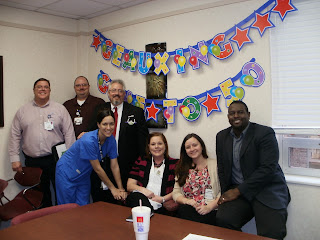(This is reposted from LinkedIn. Good comment by Dr. J. Igbal that I wanted to share. This guy is the kind of doctor us administrators love! ~ Bob)
TV serials based on Hospitals are dominated by doctors only...
Dear All,
I am writing this specially for non-medicos to provide currect picture of any hospitals around. I was watching TV and found serials based on hospitals showing easy life of doctors and administrators. They are engaged in their personal lives doing nothing.
Doctors on television seem to lead exciting and fulfilling professional lives (their personal lives are disastrous in comparison, but that makes for good TV). Others are neglected.
I am writing this specially for non-medicos to provide currect picture of any hospitals around. I was watching TV and found serials based on hospitals showing easy life of doctors and administrators. They are engaged in their personal lives doing nothing.
Doctors on television seem to lead exciting and fulfilling professional lives (their personal lives are disastrous in comparison, but that makes for good TV). Others are neglected.
There are many people that hear the call to save lives, but not all of them like cutting into people. The hospital administrator plays a vital a role in saving lives, without having to take scalpel in hand. Hospital administrators manage hospitals, outpatient clinics, hospices, and drug-abuse treatment centers. In large hospitals, there may be several administrators, one for each department. In smaller facilities, they oversee the day-to-day operations of all departments.
The Bradley Center for Psychiatry Administrative Team
circa 2012
Administrators
make sure hospitals operate efficiently and provide adequate medical
care to patients. Their responsibilities are numerous and sometimes
require the assistance of the medical and support staff. They act as
liaisons between governing boards, medical staff, and department heads
and integrate the activities of all departments so they function as a
whole. Following policies set by a governing board of trustees,
administrators plan, organize, direct, control and coordinate medical
and health services. Administrators recruit, hire, and sometimes train
doctors, nurses, interns, and assistant administrators.
Administrators
plan budgets and set rates for health services. In research hospitals,
administrators develop and expand programs and services for scientific
research and preventive medicine. In teaching hospitals, they aid in the
education of new doctors. Administrators plan departmental activities,
evaluate doctors and other hospital employees, create and maintain
policies, help develop procedures for medical treatments, quality
assurance, patient services, and public relations activities such as
active participation in fund-raising and community health planning.
Hospital administrators work long or irregular hours. Hospitals are open
round the clock – 24/7 – and administrators may be called in at any
hour to make decisions and resolve disputes. Administrators also attend
staff meetings, participate in health planning councils, go to
fund-raising events, and travel to professional association conventions.
A hospital administrator’s job is difficult and demanding. They need to
keep up with advances in medicine, computerized diagnostic and
treatment equipment, data processing technology, government regulations,
health insurance changes, and financing options. While doctors strive
to keep the blood flowing and the heart beating, the hospital
administrator is doing his job in keeping the hospital alive and
healthy.
Best Regards,
Dr. Jawed Iqbal
Best Regards,
Dr. Jawed Iqbal

